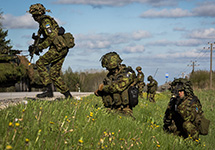December 8, 2015
Miles A. Pomper with Egle Murauskaite, Nikolai N. Sokov, and Jessica C. Varnum

A highly trained and specially equipped quick response unit of the Estonian army, from the 1st Scouts Battalion, secures a road in rural Estonia during Exercise SIIL/Steadfast Javelin. (Source: nato.int)
Russia’s military actions in 2014 and 2015, particularly in Crimea, Ukraine, and Syria, have upended expectations among NATO members about their security and the future course of NATO-Russian relations. In response, many of the NATO states bordering Russia have argued for reinvigorating NATO’s deterrent capabilities after two decades of drawing down conventional and nuclear forces in the immediate post-Cold War era.
At its 2014 summit in Wales, NATO agreed to a number of short-term measures to bolster the alliance’s conventional deterrent, dubbed the Readiness Action Plan. But as the standoff with Russia has continued, some analysts—particularly in the United States—have argued for additional deterrence measures, including in the nuclear realm.
In response, researchers from the James Martin Center for Nonproliferation Studies of the Middlebury Institute for International Studies at Monterey travelled to the NATO front-line states of the Czech Republic, Estonia, Lithuania, Poland, Romania, and Turkey to assess the perceptions of governmental and nongovernmental experts regarding how NATO should respond to Russian actions, with an emphasis on how nuclear issues should be addressed. Our research also included meetings with experts in Germany, the United Kingdom, and the United States, as well as a thorough review of existing literature in the field on issues such as Russia’s new military approach and US nuclear weapon policies—past, present, and future. It was conducted with the aim of providing analysis and recommendations to NATO states in advance of the July 2016 NATO summit in Warsaw. The following report highlights the key findings of this research, provides analysis on a country-by-country basis, and concludes with recommendations for consideration in Warsaw.
The research was made possible by the financial support of the Heinrich Böll Stiftung (HBS) North America. Other HBS offices also supported this work by convening roundtables of experts: HBS Warsaw and the Euro-Atlantic Association (SEA) brought together experts in Poland; HBS Prague organized a similar meeting with the Institute of International Relations (IIR) in the Czech Republic; and HBS headquarters held a meeting of German experts at its office in Berlin. Also helpful in forming this research were meetings at Wilton Park in the United Kingdom in June 2015 and a meeting at the Center for Economics and Foreign Policy Studies (EDAM) in Istanbul.
